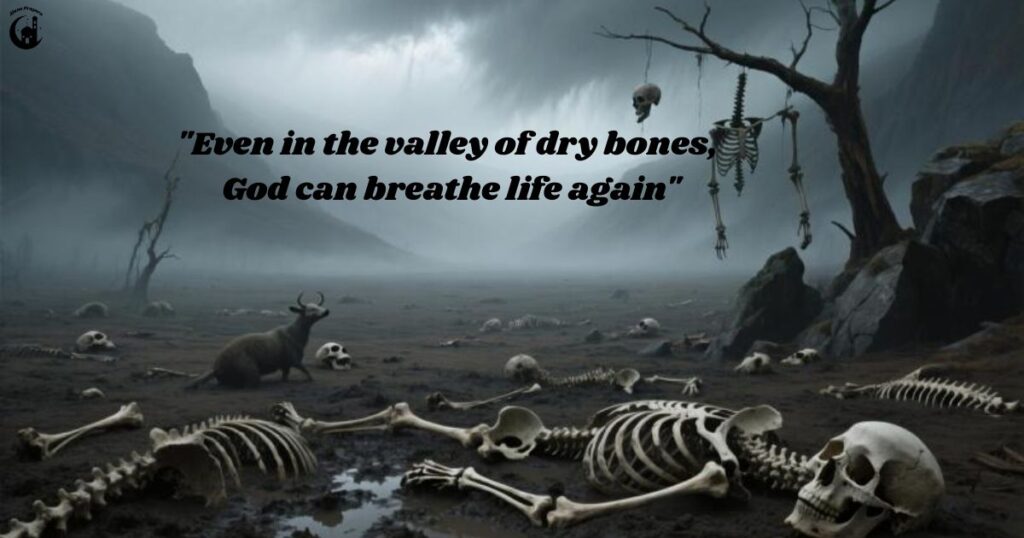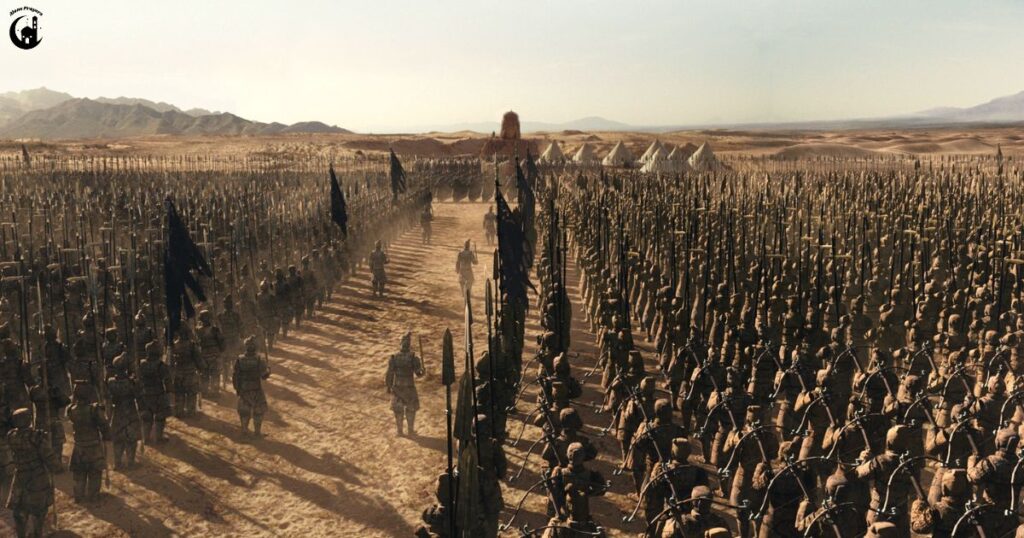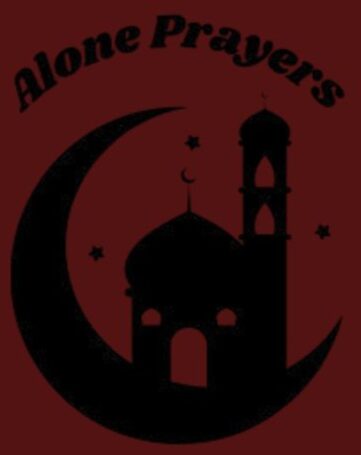Ezekiel 37:1–14 paints a powerful picture of God’s ability to bring life to what seems completely lost. In this vision of the valley of dry bones, God takes the prophet Ezekiel on a journey through hopelessness and then shows him how divine breath can restore what is dead. This passage speaks not only to Israel’s situation in exile, but also to our own moments of spiritual dryness, discouragement, and defeat.
When everything appears lifeless, God reminds us He is still at work, bringing revival, renewal, and purpose. But what does Ezekiel 37 mean for us today? As we explore the meaning of Ezekiel 37 and its relevance, we’ll discover how God’s Spirit still breathes life into dry bones. Whether you’re facing a personal valley or a spiritual drought, this chapter offers hope, restoration, and a powerful call to faith.
The Vision of the Valley of Dry Bones

After God shows Ezekiel the valley of dry bones, He gives a divine command: “Prophesy to these bones.” Ezekiel obeys, and as he speaks the word of the Lord, a miracle begins. The bones rattle, come together, and are covered with flesh.
Yet, there’s still no life in them. Then God commands Ezekiel to prophesy again, this time to the breath. When he does, breath enters the bodies, and they stand on their feet alive, strong, and ready.
This passage underscores the two elements necessary for revival: the Word of God and the Spirit of God. The Word brings structure, form, and truth; the Spirit brings life, energy, and power. One without the other is incomplete.
Even today, churches and individuals may have form but lack life, or emotion but no biblical foundation. Ezekiel 37:1–14 reveals that both are required to experience full spiritual renewal.
This section also reminds us that God involves us in His miraculous work. He doesn’t just command the bones directly. He asks Ezekiel to prophesy. In the same way, God uses us to speak life into situations that seem dead.
When we declare Scripture, pray in faith, and invite the Holy Spirit, we become part of God’s restoration process. This is one reason why Ezekiel chapter 37 still speaks so strongly today.
God explains the vision to Ezekiel in verse 11: “These bones are the whole house of Israel.” The people had lost all hope and saw themselves as cut off and forgotten. But God’s message is clear: He will open their graves, bring them back to life, and restore them to their land. More than a physical return, this is about spiritual awakening.
For modern readers, this is deeply relevant. Whether it’s personal discouragement, societal decay, or global despair, Ezekiel 37 meaning tells us that God can turn things around.
He is not just the God of the past; He is the God who resurrects futures. When we feel spiritually dead or far from purpose, this passage offers a divine promise: life can come again, and it will be by God’s Spirit.
Hope and Restoration for Today
Ezekiel 37 mean for us today; It speaks of hope amid despair, revival after ruin, and restoration through God’s faithful love. It tells us that even the most shattered lives and communities can be renewed. God is still breathing life into what looks lost.
Many people face “dry bone” seasons in life times when faith feels dry, prayers feel unanswered, and spiritual energy is gone. The message of Ezekiel 37 invites us to trust in the restoring power of God. He can bring wholeness to broken dreams, spiritual energy to tired hearts, and unity to divided communities.
The valley of dry bones teaches us to:
Speak life through Scripture.
Pray for the breath (Spirit) of God to move.
Never lose hope, even when things look beyond repair.
This isn’t just a metaphor. In real life, we’ve seen marriages healed, addicts delivered, and churches revived. The same God who breathed life into bones can breathe on our circumstances today. This is why understanding the Ezekiel 37:1–14 explanation is vital for every believer.
While the vision was initially for Israel, many believe Ezekiel’s prophecy also applies prophetically to the Church and even nations. The Church in some areas has lost its fire and zeal. Many nations have turned from God, embracing spiritual dryness. Yet this vision gives us hope.
If God could raise up an entire army from dry bones, He can revive the Church. He can awaken a new generation of believers who walk in truth and power. This makes Ezekiel chapter 37 not only a comfort but a prophetic call.
It calls the Church to prophesy, to speak, and to believe that God is still raising up life where there was once only death.
As believers, we must pray with boldness: “God, breathe on our land again.” That’s not just wishful thinking; it’s grounded in Scripture. Ezekiel’s vision gives us a model for believing and declaring spiritual revival.
From Hopelessness to an Exceedingly Great Army

Perhaps the most inspiring part of Ezekiel 37 is the final image: “an exceedingly great army.” What began as a valley of bones became a living, unified, and powerful force. This shows the personal and collective transformation God brings.
Each bone represents a person. Each connection represents restored relationships and unity. When the Spirit breathes, they don’t just live, they rise and stand as an army. This reminds us that God’s restoration always leads to purpose. We’re not revived just to feel better; we’re revived to stand, serve, and fulfill God’s mission.
Ezekiel 37:1–14 is more than a vision, it’s a call to faith. It teaches that no one is too far gone. It encourages us to believe, speak, and welcome the Spirit. When we do, we’ll witness the impossible become reality.
So when you ask, “What does Ezekiel 37 mean for us today?” The answer is simple: it means that our valleys are not the end of the story. Dry bones can live again. The breath of God still moves. Hope is never lost when God is involved.
In one of the most compelling prophetic visions in the Bible, Ezekiel 37 presents a dramatic image: a valley filled with dry, lifeless bones. This wasn’t just a poetic metaphor, it was a divine revelation of Israel’s state of despair, desolation, and separation from God.
The prophet Ezekiel, led by the Spirit of the Lord, is brought into this vision, where he witnesses what appears to be the finality of death. But God had a different plan.
God’s Timeless Promise of Revival
“The hand of the Lord was upon me, and He brought me out by the Spirit of the Lord and set me in the middle of a valley; it was full of bones” (Ezekiel 37:1).
What does Ezekiel 37 mean for us today? On the surface, it speaks to the literal scattering and restoration of the nation of Israel, a prophecy fulfilled in part through the historical return of Jews to their homeland, including the monumental rebirth of the modern state of Israel on May 14, 1948.
But deeper still, Ezekiel 37:1-14 serves as a timeless message of hope, revival, and restoration for both individuals and communities.
In Ezekiel’s time, the Jewish people were experiencing the crushing weight of exile. The northern kingdom had been destroyed by Assyria, and the southern kingdom, Judah, had fallen to Babylon. Jerusalem was in ruins.
Many had been killed, others exiled, and the identity of God’s people seemed scattered and lost. Ezekiel 37:1-14 explanation is more than a historical snapshot; it’s a divine proclamation of hope against hopelessness.
The bones Ezekiel saw were not just dead; they were described as “very dry” (Ezekiel 37:2), symbolizing utter hopelessness. When God asked Ezekiel, “Can these bones live?” the prophet wisely responded, “Sovereign Lord, you alone know” (Ezekiel 37:3).
It’s the kind of faith that trusts in God’s power when human reasoning sees no way forward.
From Hopelessness to Restoration

Ezekiel 37 meaning expands far beyond ancient Israel. In this vision, we see the spiritual condition of a people cut off from their source dry, scattered, and stripped of life. And this isn’t just a national story; it’s a human story. How often do we find ourselves spiritually depleted, emotionally dry, and disconnected from purpose?
Whether due to personal failures, trauma, sin, or life’s unpredictable battles, we can relate to those dry bones. Yet God is not finished with us. His Word speaks life. His Spirit breathes revival. In the valley of despair, God declares restoration.
“This is what the Sovereign Lord says to these bones: I will make breath enter you, and you will come to life” (Ezekiel 37:5).
This promise isn’t limited to a certain era or people; it’s the heartbeat of the Gospel.
As Ezekiel prophesied, something miraculous began to happen: “There was a noise, a rattling sound, and the bones came together, bone to bone” (Ezekiel 37:7). This is where we begin to understand how God orchestrates restoration.
The scattered parts of our lives, broken dreams, painful memories, lost faith begin to connect again under His divine authority.
But notice the next detail: although the bodies took form with tendons, flesh, and skin, “there was no breath in them” (Ezekiel 37:8). Structure alone is not enough. Religion without the Spirit is lifeless. Identity without intimacy with God is hollow.
That’s why God commanded Ezekiel a second time to prophesy not to bones now, but to the breath.
“Come from the four winds, O breath, and breathe into these slain, that they may live” (Ezekiel 37:9).
It is this divine breath the Hebrew word ruach meaning breath, wind, or spirit that turns formation into function. The Spirit of God is the difference between existing and truly living.
Once the breath entered them, the vision declares that they “stood up on their feet a vast army” (Ezekiel 37:10). Not just restored individuals, but a united, purposeful people ready for battle.
This transformation from dry bones to a mighty army is symbolic of how God revives His people for a purpose. You’re not just restored to feel better, you’re revived to stand, serve, and carry God’s truth into the world.
The implications for us are profound. This passage calls us to personal revival, to recognize the power of God’s Word and Spirit to bring us back from any spiritual death.
Whether you’re in the United States, Europe, or anywhere across the globe, the promise of Ezekiel 37:1-14 still rings true: God brings dead things to life.
Historically, this vision also points toward the miraculous survival and regathering of the Jewish people. From the horrors of the Holocaust to the establishment of Israel in 1948, we see the prophetic echoes of Ezekiel 37:11-14 fulfilled: dry bones regathered, graves opened, and a nation reborn.
I will bring you back to the land of Israel… I will put my Spirit in you and you will live” (Ezekiel 37:12-14).
Ezekiel chapter 37 is not just a passage about Israel’s return, it’s a story of God’s covenant faithfulness. And it reminds us that no matter how bleak things may look, the Word of God still speaks life, and His Spirit still breathes restoration.
Ezekiel 37 is as relevant now as ever. Spiritually, many today feel dry, cut off, and forgotten. But God’s message to Ezekiel is His message to you: “You will live.”
Whether you’re facing anxiety, spiritual stagnation, depression, or simply feeling purposeless God wants to breathe new life into your soul.
It also reminds the Church that revival begins not with hype but with a return to the Word and a surrender to the Spirit. We must preach the Word and welcome the breath. Formation must be followed by infilling. Only then do dry bones become armies
Ezekiel 37 shows us that God is not intimidated by death, dryness, or desolation. He speaks to what looks impossible. And His Spirit activates what His Word declares.
Whether we’re looking at the past restoration of Israel or believing in a personal breakthrough, the message is the same: God revives what is dead.
So today, stand up. You are not just bones, you are a vessel for the breath of God. And the same Spirit who raised dry bones to life wants to breathe on you. He is still restoring, still healing, and still raising up armies from forgotten valleys.
Conclusion
The vision in Ezekiel 37:1–14 offers a powerful message of hope, revival, and restoration. It reminds us that even the driest, most hopeless situations can be transformed by the Word and Spirit of God. When we ask, “What does Ezekiel 37 mean for us today?” The answer is deeply encouraging: no person, church, or nation is beyond God’s power to renew.
He calls us to speak life where there is death, to believe even when things seem impossible, and to trust His Spirit to bring real change. Whether we’re in a spiritual valley or facing brokenness around us, Ezekiel chapter 37 assures us that God still brings dead things back to life. This timeless message stirs our faith, invites personal renewal, and calls the Church to believe for national and global revival. Dry bones can live again.
FAQs
What is the main message of Ezekiel 37?
The main message of Ezekiel 37 is that God has the power to restore life where there is death, both spiritually and physically. The vision of dry bones represents hopelessness, but through God’s Word and Spirit, renewal is possible. It’s a promise of restoration and revival for individuals, the Church, and entire nations.
What does Ezekiel 37 mean for us today?
Ezekiel 37 reminds us that no situation is beyond God’s ability to restore. Whether facing spiritual dryness, personal loss, or societal decay, this passage teaches that the breath of God can bring life, hope, and purpose again. It’s a powerful encouragement for modern believers.
What are the dry bones in Ezekiel 37?
The dry bones represent the people of Israel who had lost all hope during exile. Symbolically, they represent anyone who feels spiritually dead, disconnected, or beyond redemption. God’s promise is that He can revive what seems lost and breathe life into what appears lifeless.
How does Ezekiel 37 relate to revival?
Ezekiel 37 illustrates that revival begins with God’s Word and His Spirit. First comes the form through the Word, then comes life through the Spirit. It’s a biblical model for personal, church, and national revival turning spiritual barrenness into strength and purpose.
How can believers apply Ezekiel 37 in their lives?
Believers can apply Ezekiel 37 by speaking God’s Word over dead areas in their lives and praying for the Holy Spirit to move. This means declaring truth in prayer, trusting God for restoration, and believing that He can transform brokenness into strength.
What does the army in Ezekiel 37 represent?
The army symbolizes the fully restored and empowered people of God. What started as dry bones became a great force through God’s breath. It represents both personal transformation and the Church rising in unity, purpose, and spiritual power to fulfill God’s mission.
Read More Blogs: Alone Prayers
